PHOTOGRAPHER VIKTORIJA PASHUTA @viktorija_pashuta
PRODUCER JACKSON CHONG @jacksonchong_
STYLIST JESSE J. GUILLEN @jessejcollections
STYLING AGENCY SIX K MANAGEMENT @sixkla
PHOTO ASSISTANT SONNY T. SENSER @sonnyphotocom
SPECIAL THANK YOU TO ARTECHOUSE @artechouse
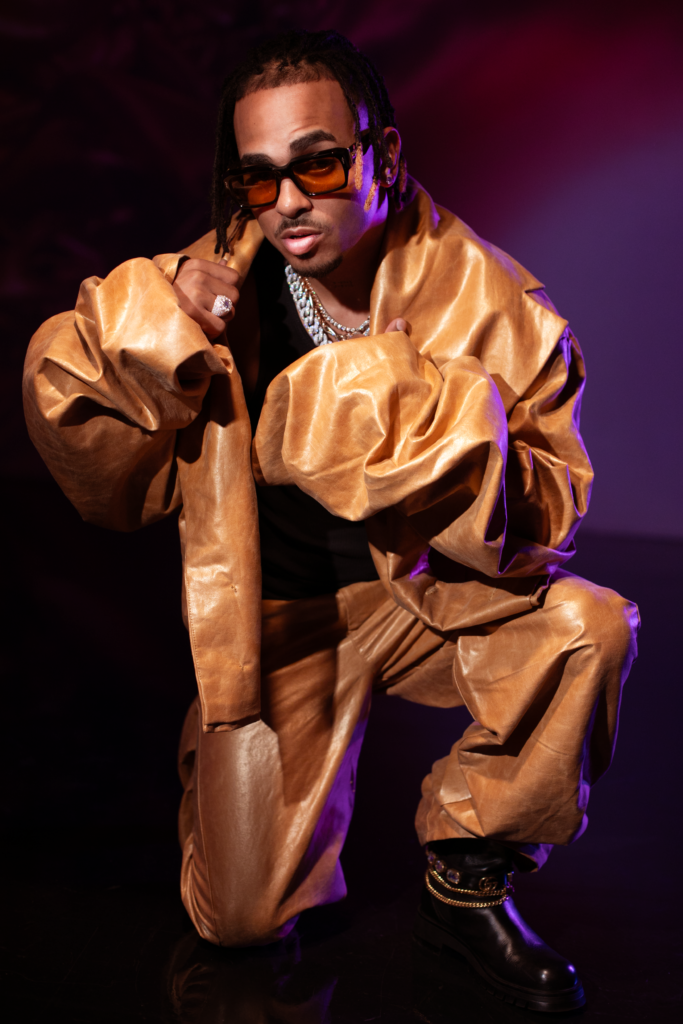
Jewelry THE 24K, EL RUSSO & CO., AVI & CO. @saljeweler1 @the24k @aviandco
Sunglasses JACQUES MARIE MAGE @jacquesmariemage
Shoes GUCCI @gucci
Showroom MAISON PRIVEE @maisonpriveepr_la
Words by Kimberly Haddad
Latin music has undeniably become a melting pot of stirring rhythms, soulful melodies, and heartfelt choruses that resonate with people from all corners of the globe. But amidst countless luminaries, one name shines brighter than the rest: Ozuna. This multi-award-winning Puerto Rican singer and songwriter has not only won countless accolades with his infectious beats, including making Time Magazine’s Most Influential People list (2019), but he has also become an inspiration for many through his inimitable style, philanthropic efforts, and ability to always preserve the soul of reggaeton and its vibrant culture. Ozuna has firmly established himself as one of Latin music’s most iconic and listened-to artists worldwide, but his path to stardom was not without its obstacles, sentiments that often flow through his visceral lyrics. “Crecí en un círculo de pobreza/ Todo era feliz, conformarse era la destreza / Abuela me crió, papi murió / Mami siempre tuvo pa’ mí, les juro que no me faltó na” (“I grew up in a circle of poverty / Everything was happy, conforming was skill / Grandma raised me, daddy died/ Mommy always had something for me, I swear I didn’t lack anything”), he sings in the title track to Odisea.
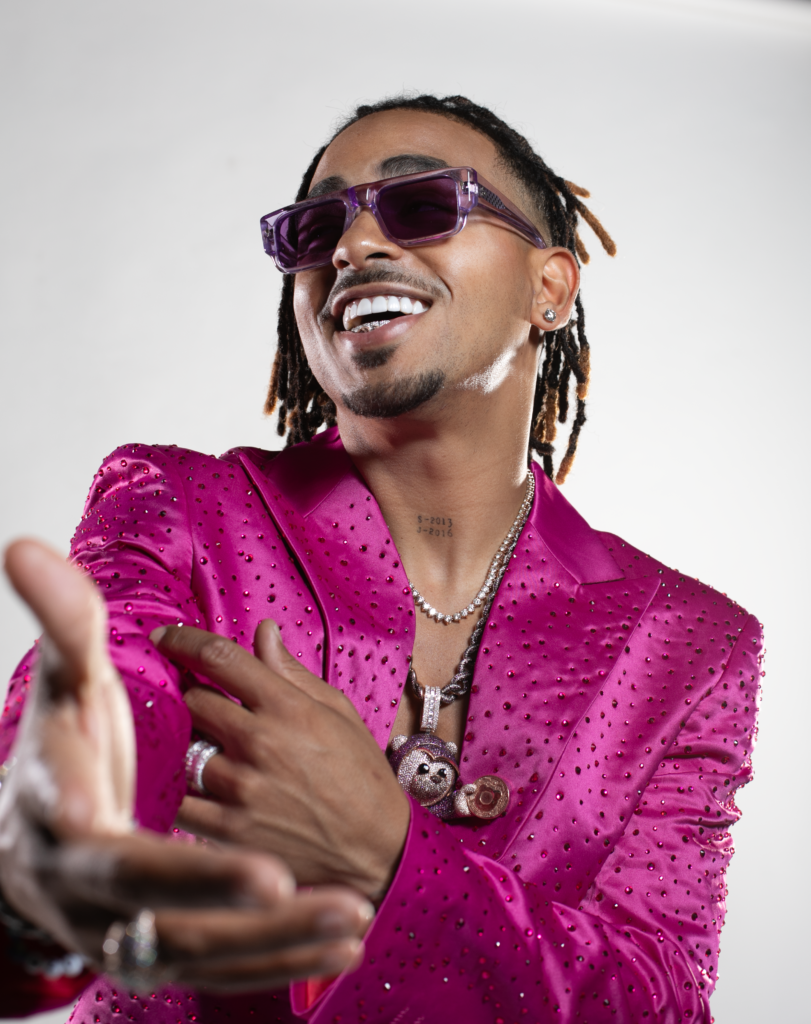
Ozuna, whose real name is Juan Carlos Ozuna Rosado, was born in San Juan, Puerto Rico to a Dominican father and Puerto Rican mother where he was exposed to a rich multicultural environment that significantly influenced his musical journey. Despite being brought up in a disadvantaged neighborhood and facing countless challenges, including the tragic loss of his father, who was a dancer for reggaeton artist Vico C, Ozuna routinely found solace in music and reveled in an array of genres, ranging from salsa and reggaeton to the magnetic tempos of bachata and merengue.
The passing of Ozuna’s father occurred when he was just a toddler, leaving his mother struggling to support him financially. However, his upbringing wasn’t only reliant on his mother as he mostly lived with his grandmother. Humble and hardworking, she instilled in him a Christian faith, emphasizing the notion that nothing in life comes without effort. She believed that every single thing, be it a pair of sneakers or even a pencil, is bought with sacrifice, Ozuna told Billboard in a previous interview.
“They raised me with a lot of love and discipline,” Ozuna said. “As a little kid, I remember my grandmother used to take me to her work, a little kiosk in the town of Rio Piedras. I enjoyed helping her out there. I still have lots of great memories from [my] childhood.”
Immersed in the Latin music deeply ingrained in his childhood, Ozuna began manifesting a singing career at a mere 12 years old. In 2004, when Daddy Yankee’s irresistibly catchy beats of “Gasolina” ignited the uptrend of reggaeton worldwide, Ozuna’s uncle Felix gifted him a Samsung microphone, which became the catalyst for his musical pursuits. He would often harmonize with his uncle’s tunes, belting out songs to other reggaeton sensations like Don Omar and De La Ghetto. While these admired legends played a significant role in shaping the unique style we witness in his music today, Ozuna embraces a kaleidoscope of genres, including reggae, trap, afrobeat, hip-hop, and an eclectic fusion of contemporary sounds from around the world.
“That’s why my musical style and messages are so diverse,” he said. As time went on, Ozuna’s innate talent blossomed further, and he began to write and record his own music. Seeking inspiration from the vast expanse of YouTube, he would download beats to nurture his creative fire and occasionally performed at El Corozal, a local bar where he worked.
Ozuna had his breakthrough moment back in 2012 when he dropped his debut single, “Imaginando.” However, it was in 2015 that his career truly took off, earning the hearts of fans and industry insiders alike with his electrifying blend of reggaeton, trap, and dance hall. His lyrical talent and unmistakable voice, described by Rolling Stone’s Elias Leight as “slim but slicing, precise and hard to imitate,” struck a chord with audiences, leading to the release of his debut studio album, Odisea (2017), which showcased hit anthems like “Si No Te Quiere”, featuring rapper Arcángel, and “Dile Que Tu Me Quieres.” Garnering critical acclaim and climbing to the No. 1 spot of Apple Music’s and iTunes’ Latin charts, the album quickly thrusted him into the forefront of the scene. Yet, amidst his meteoric rise, Ozuna has remained true to his authentic self.
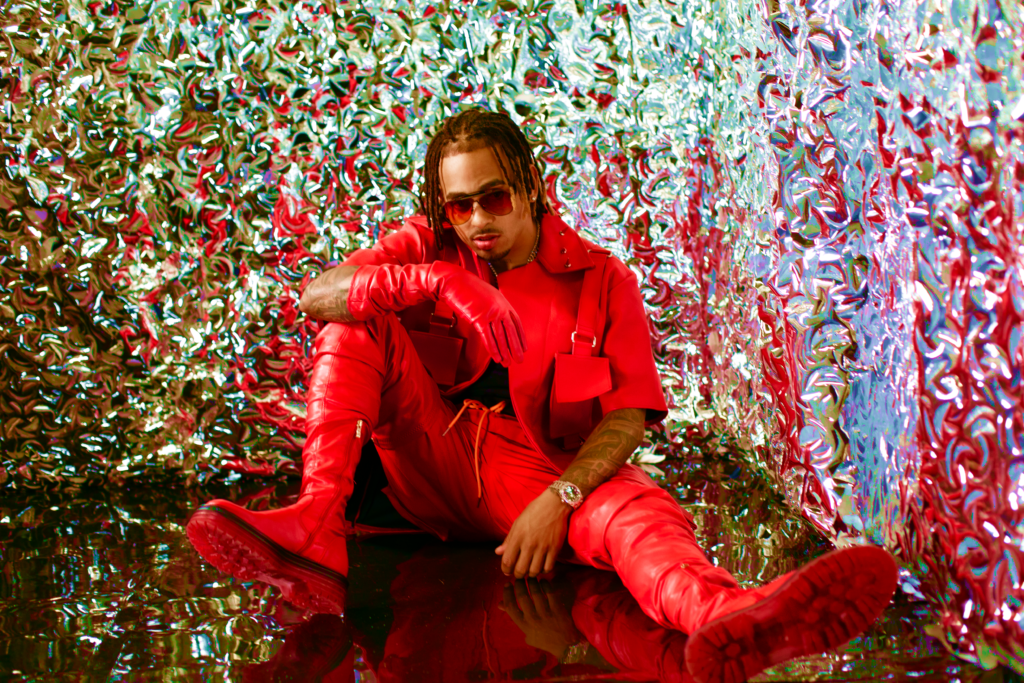
Showroom THE TREND HAUS @thetrendhaus
“I’ve always just been myself in every aspect,” he said. “Although the demands of my job in the music industry sometimes requires dressing up or acting a certain way, my identity is always there. My fans are like my family, so every now and then, I share on social media the things I do on a normal day—family, activities with my kids, vacations, playing basketball with my friends, or just riding my bike around the neighborhood. I show myself just as I am all the time. And I think my fans enjoy and appreciate it that, as they can feel like they know me on a more personal level.”
With each subsequent release, Ozuna has continued to seamlessly blend genres and explore new musical territories. His collaborations with prominent art ists such as Selena Gomez (“Taki Taki”), Cardi B (“La Modelo”), Bad Bunny (“El Amante”) and Sia and Doja Cat (“Del Mar”), have not only amplified his popularity but also expanded his reach to an international audience. Since then, Ozuna has accumulated 14 Latin Grammy nominations, became BMI’s Contemporary Latin Songwriter of the Year (2019, 2021) and won Contemporary Latin Song of the Year for “Taki Taki” (2020). In addition to his most recent EP Afro, featuring popular afrobeat artists Omah Lay and Davido, Ozuna is gearing up to launch his next album Cosmo.
“Cosmo is an evolution of the music style that has defined me as an artist in the past years,” he said. “In this project, I experimented with fresh sounds while staying true to the reggaeton essence. Every collab I chose for Cosmo is special and unique.”
Ozuna’s journey from modest beginnings to becoming a global Latin music star has inspired millions, but his impact extends far beyond his music. In 2017, he established the Odisea Children Foundation, a non- profit organization dedicated to improving the lives of children facing adversity. Ozuna’s commitment to giving back to his community has earned him admiration and respect from his many fans. Yet, more importantly, his altruistic acts have led him to understand the value of having compassion and empathy for others.
“It’s something that comes from my heart,” he said. “I’m so grateful to God for all the blessings in my life, and if I can help others in need, I want to, always. It is my way of giving back. Even the smallest gesture can have a significant impact on someone’s life.” Whether it be the raw emotion he pours into his lyrics, his ongoing advocacy for social change, or the genuine selflessness he carries from his family, it is obvious that Ozuna radiates love not only through his artistry, but also in his ability to connect with people on a deeper level. And as he continues to evolve, one thing is certain: his status as an inspirational figure will remain etched in music for years to come.
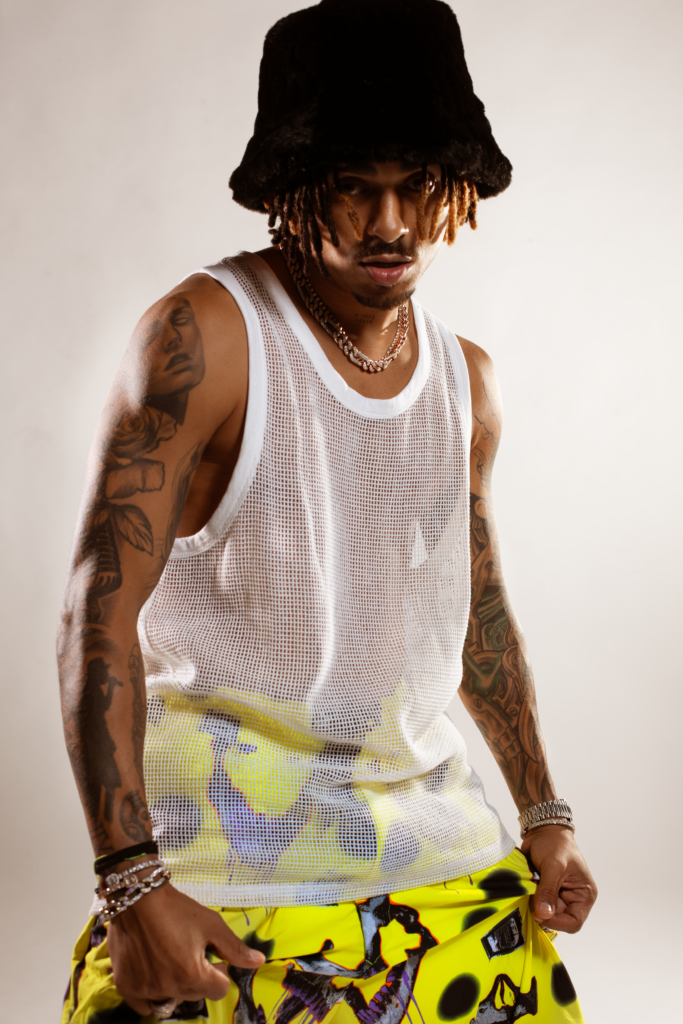
Top ALLSAINTS @allsaints
Pants KIDILL @kidill
Showroom NO SUCH AGENCY @nosuchagencypr
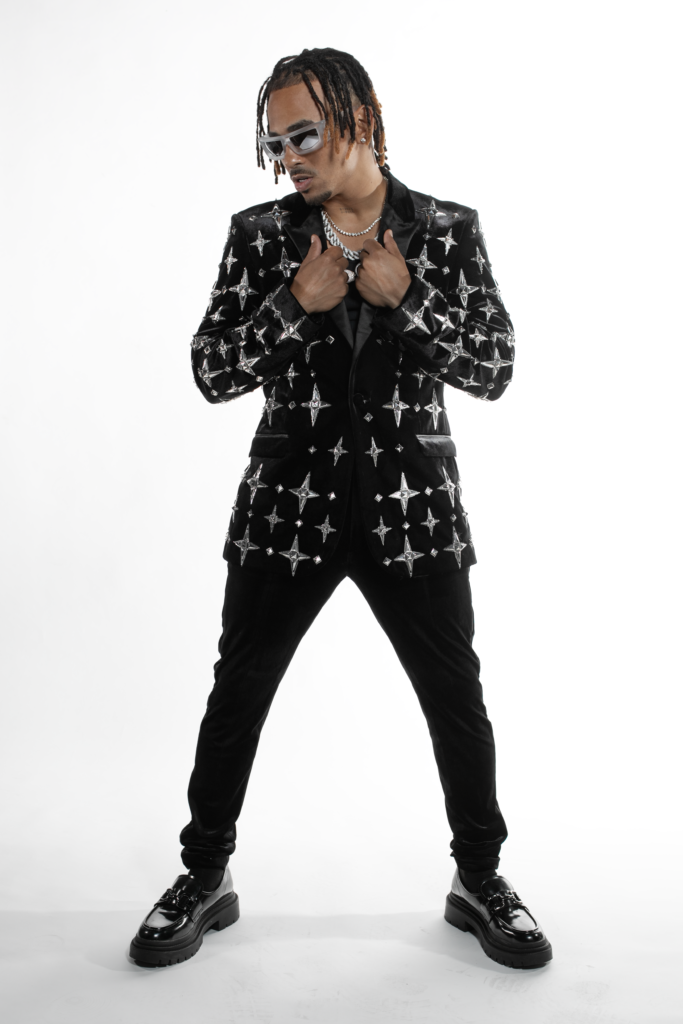
Shoes PRADA @prada
Showroom STYLE PR @stylepr
As a trendsetter in the industry, how do you stay true to your personal fashion preferences while keeping up with evolving fashion trends?
I’m always looking out for the next moves in the fashion world—what’s going on at the runways, what’s coming up for the next seasons in terms of colors and styles—to figure out what I feel fits with my image and personal fashion prefer- ences. Lately, I’m also paying attention to garage designers, one of the latest evolving trends right now. I just like to have fun and express myself through clothes.
You are known for changing up your hair styles quite a bit over the years. Have these changes represented different facets of your personality and/ or artistic evolution?
I believe that just like music evolves, the style’s gotta keep up. When it comes to the hair game, I’m not afraid to try different styles to stay fresh.
What’s your take on current fashion trends and are there any fashion trends or styles that you see emerging in the Latin music industry?
Latin music has many variations of styles and fashion trends tend to also depend on the artists identity and music genre. We are very detail-oriented when it comes to dressing up. It’s all about making a state- ment with our whole drip.
If you could switch professions for a day, what unexpectedly strange job would you choose and why?
A pilot, because I am always traveling, either for work or vacation. That could be a dope experience.
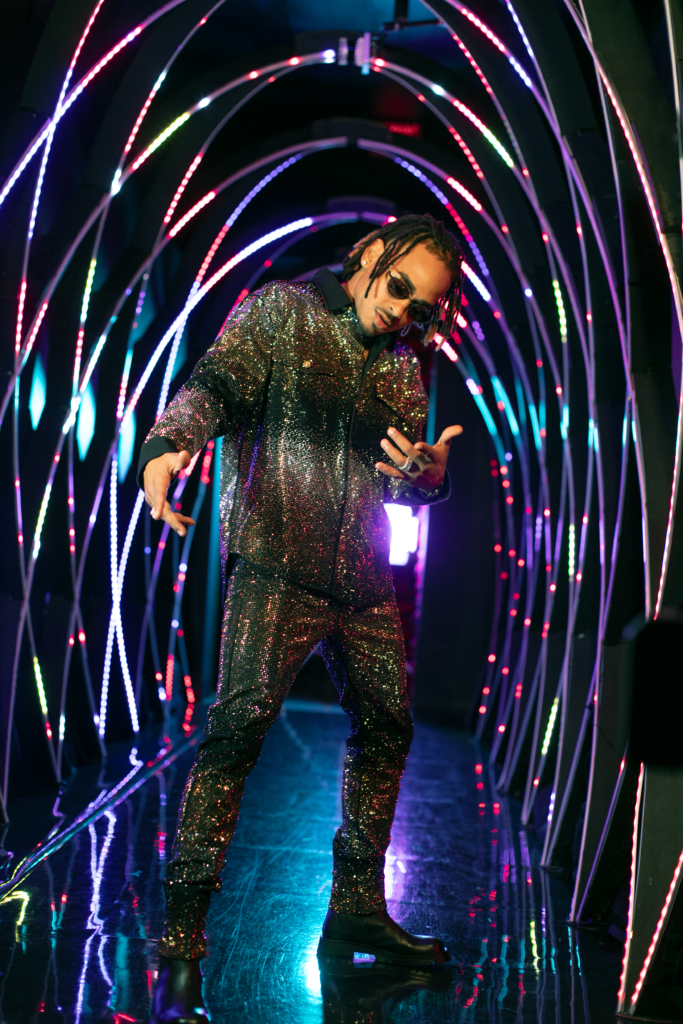
Shoes DOLCE&GABBANA @dolcegabbana
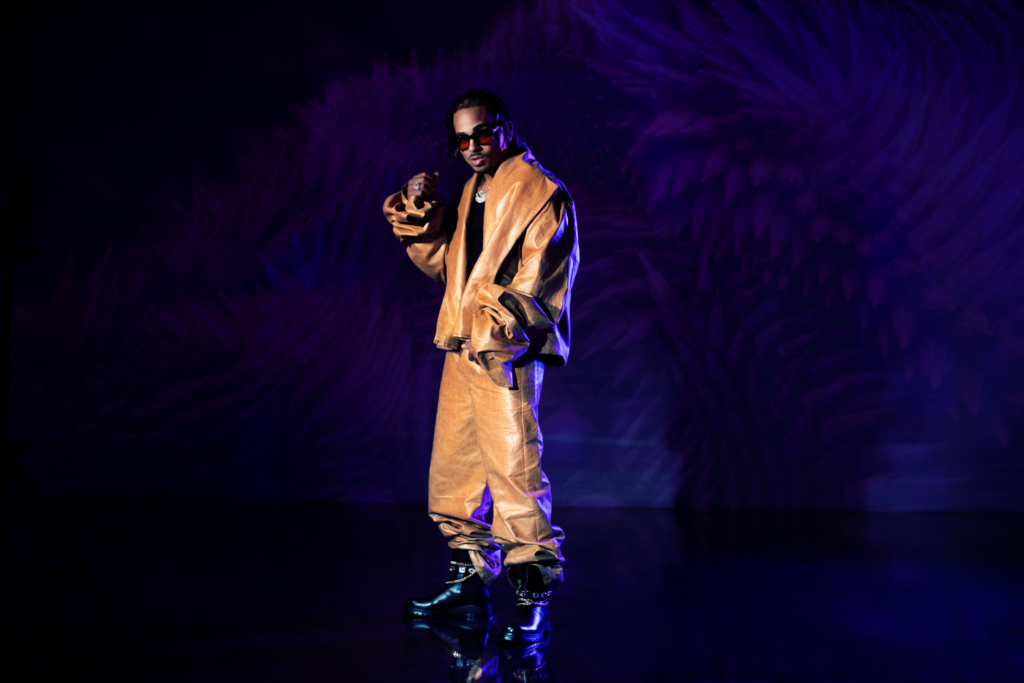
@tellthetruth.shop
Jewelry THE 24K, EL RUSSO & CO.,
AVI & CO. @saljeweler1 @the24k
@aviandco
Sunglasses JACQUES MARIE MAGE
@jacquesmariemage
Shoes GUCCI @gucci
Showroom MAISON PRIVEE
@maisonpriveepr_la
If you could visit any era in history or witness any event from the past, which moment would you choose and why?
A Fania All Stars concert at the Yankee Stadium in the early 70s. It would have been so epic to be there watching all the big salsa and tropical music stars at that time, on stage together. These legends marked an important era in Latin music history and their legacies continue to influence the new generations of Latin artists and musicians.
If you were trapped on a deserted island with only one song on repeat, what song would drive you crazy the slowest?
“Guatauba” by Plan B.
If you could swap lives with anyone for a day, who would it be and what mischief would you get up to in their shoes?
Marc Anthony, and I would just throw a massive bash. Everyone would be invited!
If you could cook a meal for a famous person, who would it be and what would you serve?
Kim Kardashian. I take pride in my coffee-making skills, so I’d invite her to [have] a cup of my own brewed coffee.
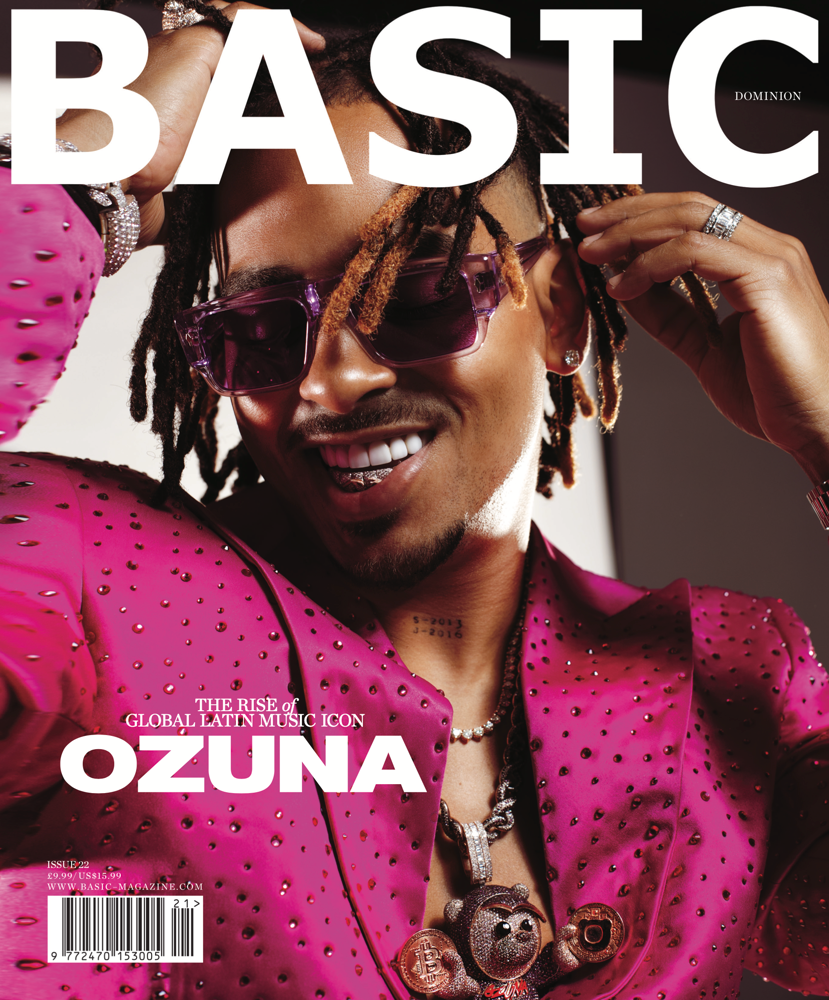
You may also like
-
Queen Degenerate: An Interview with Pop’s Wild Card Snow Wife
-
Staying Loud, Staying True: Spacey Jane’s Evolution from Perth to the World
-
Reframing Narratives with KATHERINE FLYNN
-
FIGHT TO THE OTHER SIDE: Hilary Roberts on Suffering, Freedom, and Sharing her Mafia Gifts
-
SEXY 4EVER – An Interview with INJI
-
BREAKING BREAD with GAVIN ROSSDALE: A Conversation about Music, Food, and the Art of Hospitality